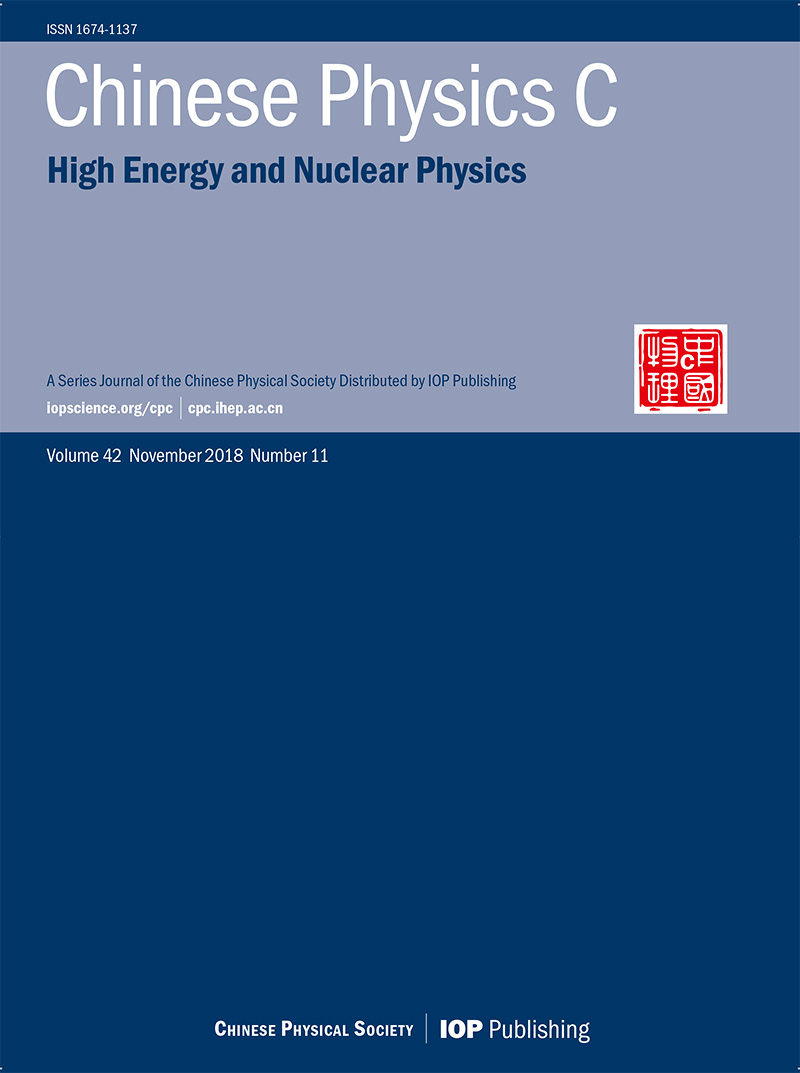1985 Vol. 9, No. 3
Display Method: |
The performance of a 1m×1m drift chamber system have been measured with on-line microcomputer using comic rays. The time resolution is 4.26 ns. The spatial resolution is 132 μm and the efficiency is above 96%. The experimental set-up include five 1m×1m adjustable field drift chambers, scintillation counter trigger system, readout electronics and a TRS-80 microcomputer. The data acquisition and processing have been done with on-line microcomputer and off-line data analysis.
Using CKP model and the results from accelator experiments, the efficiency of a hadron detector, consiststing of Pb-target and G-M counters, is simulated. The simulation technique for CKP model is discussed.
Using a large magnetic spectrometer, the vertical differential spectra for pions and protons in the momentum range (5—50)GeV/c at 3220 m above sea level were measured. The spectra of pions and protons can be given by jπ-(P)=9.6×10-4p-2.6(cm2﹒sr﹒s﹒GeV/c)-1 and jp(P)=1.26×10-3p-2.5(cm2﹒sr﹒s﹒GeV/c)-1 respectively. The flux ratio for pions to protons is 0.62±0.14.
The degradation of some performances of the drift chambers irradiated with 5 MeV electron beam has been tested. The gas mixtures filled were Ar/CO2, Ar/CH4 and C4H10 in proportion.
The dark current, the pulse height, the energy resolution and the counting rate plateau have been measured during the irradiation.
The U(6/20) supersymmetry is discussed in this paper. Particularly we discuss its Spin (6) limit. First we discuss the reduction of the group chain of the Spin(6) limit. Secondly we derive the wave functions and excited energy formulas for the nuclei in which the Spin(6) limit of U(6/20) supersymmetry exists. Thirdly we make comparison of the nuclear energy spectra between the theoretical calculation and experimental measurement in the case of nucleus 77193Ir116. The comparison shows that the Spin(6) limit of U(6/20) supersymmetry possibly exists in nucleus 77193Ir116.
On the base of Glauber's theory, nuclei-nuclei inelastic scattering amplitudes are given by using the rigid projectile approximation. Inelastic scattering differential cross sections of α+C12 at 1.37GeV with 2+(4.43MeV) and 3-(9.64MeV) of C12 in the final state are calculated. The influence of the different density distributions of the projectile nuclei on nuclei-nuclei inelastic scattering is discussed.
Based on the two nucleon pion absorption mechanism, the reaction (π+d) is studied. The formula of the differential cross section for (π+d) reaction is obtained for S-wave πN interaction. A calculation is also performed for 12C(π+d)10C(0+,2+) at the incident energy of 49.3MeV by using the plane wave approximation. The results indicate that the effect of the D-wave component in the deutron wave function is quite important. The antisymmetric space structure of the neutron pair participated in the process is as the important as symmetric one.
An equivalent one boson exchange potential for N-N interaction with the form factors of the vertices is derived in the configuration space from the quark-antiquark creation model. The results are consistent with the phenomenolagical N-N interactions in the medium and long range parts quite well.
The potential well depth of Λ particle in nuclear metter is calculated by using the Λ-N potential from single K, η, ω and 2π, πρ meson exchanges.
The energy multiplication factor of ED and the energy spectrum which is caused by the instantaneous beam loading compensated by the inherent energy spectrum of ED in electron Linac are derived under the condition of the linear variation for the top of the klystron output pulse.
The angular distribution has been measured for elastic scattering on 40Ar with 11B and for the single proton transfer reaction 40Ar(11B, 10Be)41K at the incident beam energy of 50 MeV. The elastic scattering cross section has been fitted in terms of the optical model. The EFR-DWBA aproach with recoil effect has been used to analyze the differential cross section. The spectroscopic factor was extracted.
The single-particle widths, the spectral function as well as the hole occupation numbers are calculated by means of the complex off-shell single-particle potential obtained from the Skyrme interactions in nuclear matter. The calculated results are reasonable and comparable to some extent with the experimental data available.
The projectile-like fragments produced by 80.6MeV 16O on 27Al were measured using the large area position sensitive ionization chamber. The energy spectra, angular distributions, contour plots of d2σ/dΩdE in the E-θ plane of the reaction products from Li to Na and the Z-distribution were obtained. The cross sections of the quasi and deep inelastic scattering were introduced. A brief discussion of the experimental results is also given.
Based on the so-called modified Jancovici-Schiff (MJS) substitution the interacting boson model (IBM) is treated as an approximation to the boson description adopted in the intermediate stage of a fermion description of nuclei. A unitary transformation is introduced to determine microscopically the IBM bosons and the IBM Hamiltonian. A general formula is given to transform the IBM state vectors back into the fermion state space.
It is proved that the contribution to the fluctuation cross sections from the equilibrium stage in all the microscopic theories and phenomenological approaches advanced so far of precompound reactions is given by the conventional Hauser-Feshbach formula, and that the Hauser-Feshbach cross section makes the leading part of the total cross sections. This conclusion is intuitive, and our proof, not like the numerical illustration as some people do in this regard, is thoroughly a theoretical one.
The rate of escape of Brownian particle over doubly peaked potential barriers is calculated by the exact solution of the Smoluchowski equation. It is found that the rate depends strongly on the form of the potential barriers.
We analyse the necessity and possibility of introducing an axial vector piece into the effective potential in order to cancel the spin-orbit interactions and the problems related thereby.
In this paper, the motion for the spin one half particles with arbitrary isospin in the field of a't Hooft-Polyakov magnetic monopole (in the Prasad-Sommerfield limit) is studied by the method of the moving frame. An exact solution of the Pauli equation for the total angular momentum J=0 and isospin I=1/2 is presented. The question of Proton decay catalysis is briefly discussed.
Utilizing the relativistic B-S wave function of the (0—1/2) electromagnetic bound system, the analytic expressions of the electromagnetic form factors of this system are obtained up to the order of O(α).
The interference between the spinor components of the polarized neutron beam passed through a Mezei-coil, i.e. spin interference, is investigated. The influence coming from the earth gravitation on the Neutron Spin Echo(NSE) is calculated. We point out that this quantum interference effect due to gravitation will not violate the weak principle of equivalence, so it has a significant diffrence to the COW experiment.
The one-soliton solutions of the so called super sine-Gordon equation-one of the two-dimensional supersymmetric models-are obtained.
ISSN 1674-1137 CN 11-5641/O4
Original research articles, Ietters and reviews Covering theory and experiments in the fieids of
- Particle physics
- Nuclear physics
- Particle and nuclear astrophysics
- Cosmology
- A SCOAP3 participating journal - free Open Access publication for qualifying articles
- Average 24 days to first decision
- Fast-track publication for selected articles
- Subscriptions at over 3000 institutions worldwide
- Free English editing on all accepted articles
- CPC Announces 2025 Outstanding Reviewers
- Chinese Physics C Outstanding Reviewer Award 2023
- Impact factor of Chinese Physics C is 3.6 in 2022
- 2022 CPC Outstanding Reviewer Awards
- The 2023 Chinese New Year-Office closure
- Cover Story (Issue 2, 2026) |The images of Brans-Dicke-Kerr type naked singularities
- Cover Story (Issue 1, 2026) A focused review of quintom cosmology: from quintom dark energy to quintom bounce
- Cover Story (Issue 11, 2025) The Earth-Magnet Assists DAMPE in Studying Cosmic Anti-Electrons
- Cover Story (Issue 9, 2025): Precise measurement of Ïc0 resonance parameters and branching fractions of Ïc0,c2âÏï¼Ïï¼/ K+K-
- Cover Story (Issue 8, 2025) A Novel Perspective on Spacetime Perturbations: Bridging Riemannian and Teleparallel Frameworks












